10 Special Occasion Entertaining Tips You Need to Know

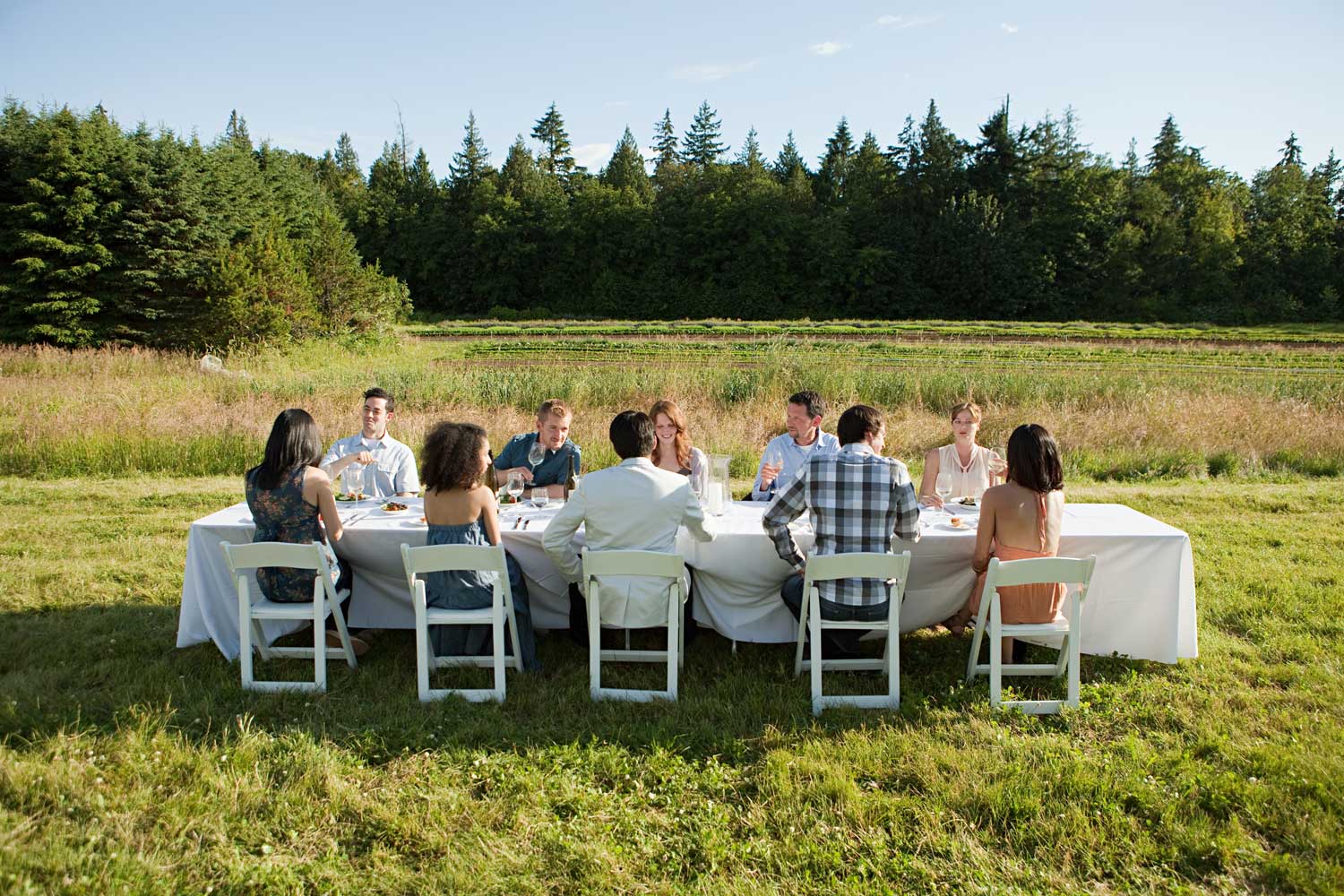
- Consider NOT having a party—no, seriously!
- The guest list
- The theme
- The menu
- The non-perishable goods
- The perishable goods: Know your numbers
- Don’t be a martyr! Get and give help
- The inviting invitation
- The entertainment
- Organize, organize, organize
I love the Indian Sanskrit verse Atithi Devo Bhavah, which means “consider the guest as God” or “guest become God.” This part of a larger Hindu scripture explains a code of conduct in which your guest is the top priority. Rituals honour the guest, and the guest (God), in turn, rewards the provider of the hospitality. This is a lovely way to think of the balance needed for special occasion entertaining!
Chefs are not your ideal dinner guest—I know! The truth is, my colleagues and I are happy to be invited when someone else is cooking, and we’re not internally criticizing your food. Instead, we’re wishing you had a few tips for easier hosting that we’ve learned in the trenches.
These tips are garnered from years of experience hosting small and large gatherings in homes, restaurants and hotels, and at catering and cooking school events. I’m happy to expand on them further; just reach out with your questions!
Create your party plan with these things in mind. Planning weeks ahead is fun, days ahead not so fun and last-minute can leave you frazzled for your guests.
1. Consider NOT having a party—no, seriously!
If it’s too stressful for you or time and circumstances simply don’t allow, there’s no upside to hosting a party! Save your generous offers and best-laid plans for the open windows in your schedule. Special occasion entertaining is work, and often, preparing can take you a little (or a lot) longer than you think.
So, when you’re feeling the urge to host, pause—then decide.
The most hospitable circumstances are when you have reasonable expectations and plans. When you enjoy the process, your guests will reward you with their appreciation. There will be a “buzz” of warm, happy chatter in your home that you’re a part of.
If you are NOT ready to host, consider supporting a local restaurant. They are happy to do the work for you!
2. The guest list
Remember to fit the number of guests to the capacities of a) your home, b) your available preparation time and c) your kitchen.
- Your guests’ comfort is utmost, and conversation flows when they feel at ease. Remember to have enough chairs to fit bottoms. Grouping extra chairs in your living room or backyard allows guests to choose seating arrangements.
- Next, think about your dinner table. How do you want the conversation to flow and the individuals to bond? Is this a casual event that doesn’t require place cards, or should you pair guests in pre-ordained groups?
- Are you over-busy at the moment? Host a small menu for a smaller gathering.
- Is your oven finicky? Size the guest list accordingly or plan to serve more cold items.
3. The theme
A cohesive theme for your party helps. It adds to the fun factor and conversation and also provides a focus for your recipe ideas and research. Maybe the theme is already decided based on the special event, holiday or season, or maybe your imagination will run wild.
4. The menu
Be inspired by your theme. Try something new! Your party is about your enjoyment and growth as a cook, too!
Collect notes and information from restaurant menus, food magazines, TV programs, online resources, cookbooks, local farmers markets, your travels and your cravings. Find a beautiful balance of flavours. Source the best quality ingredients you can. Quality ingredients are never a waste of money, and careful sourcing is a large part of your WOW factor as a host. Incorporating seasonal ingredients is always top-of-mind for me as they often deliver the best and most vibrant flavours.
Brainstorm: The best menus are a unique balancing act. For example, when planning dishes consider decadence, simplicity, nourishment, fresh local foods or global cuisines. Consider colour, crunch, comfort, artful presentations, omnivore and vegan options, and how all the senses can be stimulated. Consider your best “signature” dishes, along with any food restrictions of your guests and kind offers to help.
Reality check: Try to hold yourself back and keep the menu as simple as possible, balancing the use of your fridge, freezer, oven, microwave, BBQ and stovetop. Balance dishes that can be frozen well ahead, dishes that can be pre-prepped days ahead and dishes that must get last-minute care. Give yourself time to test your fantastic new recipes BEFORE the big event.
Don’t overdo it. Simple but flavourful and colourful nourishment, executed promptly and easily, makes for a wonderful party.
For drinks, the LCBO has a comprehensive website with detailed product lists and tasting notes for special occasion entertaining. Ask their in-store food-wine marriage experts to answer questions about your drinks menu.
5. The non-perishable goods
Take inventory of all the non-food party items you have ahead of time. Leaving this easy chore to the last minute may keep you from your much-deserved shower and last-minute change into your party dress.
Collect and count things like invitations, decorations, napkins, platters, glasses, cups, mugs, plates, china, cutlery, silverware, fresh (and non-stained!) guest bathroom towels, extra tables and chairs.
Quality cooking equipment is a HUGE asset. Gather your extra-large roasting pans. And don’t forget to sharpen your knives!
Rewash, rinse and polish serving pieces that have been in the cupboard too long so they don’t smell stale—you especially don’t want your guests smelling stale wine glasses when sipping wine.
Consider presetting the table the day before.
A note about staffing your larger party: Hiring your children or one or more catering staff (from a trusted recommendation) to support you in the kitchen, “on the floor” or at the bar is money well-spent for very special occasions to prevent missed conversations with friends or family spats over chore delineation. If it’s a large party, give party rentals and caterers enough notice (several weeks or even months in peak season).
6. The perishable goods: Know your numbers
Plan your serving amounts carefully. It’s nice not to waste too much after working sooo hard!
It’s a fine balance between having enough nibbles and keeping guests’ appetites intact for the full enjoyment of all courses. Overeating is not sexy—anticipation is! One appetizer per person every 10–15 minutes is a good place to start. If in doubt, make extra, but consider not putting out all appetizers simultaneously. Instead, gauge appetites so people are excited to partake in your upcoming main dish(es).
Serving sizes are party-dependent, but there are some general rules of thumb. Young people often eat more than old, guys often eat more than girls, and partygoers often eat more at casual events than at formal affairs. An appetizer-only party requires more appetizers than an appetizers-before-a-dinner party.
When cooking your main course recipes, follow serving-size guidelines, but also consider the number of courses you plan to serve.
Again, always taste-test new recipes well before your party.
7. Don’t be a martyr! Get and give help
As the host, don’t hesitate to enlist the help of friends and family for ideas, recipes, cooking, chairs and participation in the fun. This is great work experience for kids! Life partners should be supportive. Welcome a friend who offers to help.
Brush up on some cooking techniques. Practice your knife skills to reduce your preparation time in the kitchen.
A few extra tips about surprisingly high-maintenance potluck parties:
For hosts:
- Consider the complication of not knowing what everyone will bring. Keep a list of who is bringing what and balance it by the capacity of your guests and your oven, cooktop, fridge, tables and serving pieces.
- Balance the dishes so that the results of a guest’s generous labour do not go uneaten.
- Preset serving pieces in anticipation of your guests’ serving needs.
- Remember that you chose the date and time of the party and not everyone will be available to help or participate.
For guests:
- Ask what is already being served and fit your offering in accordingly.
- Consider bringing food on an oven- or microwave-proof platter with serving utensils.
- Let the host know ahead of time if/how you will need to heat your item so you’re not rifling about their kitchen asking questions at peak serving time.
- If you cannot participate, bring a hostess gift or packaged food or drink item. You can pick up the slack next time!
My dirty little secret: I think potlucks—and guests expected to do dishes—can sometimes be inhospitable experiences! It’s all in the grace of the host and the particular circumstances. There’s a sweet spot to hosting and managing guest expectations.
8. The inviting invitation
Use your invitation to hint at what’s to come at your party! Whether it’s explaining the theme or a snippet of the expected menu (or the whole menu), inform your guests about the fun they can expect.
I often find details that should be explained missing from invitations. Simply outlining your party timing and style isn’t enough detail for your guests. For example,
- Tell your guests if you will feed them or not. This saves you the disappointment of preparing loads of food that people are too full to eat and your guests the disappointment of no food being provided when they expected it.
- 7:00 and 8:00 pm party times can confuse guests if the meal isn’t artfully described. Do they eat before arriving or not?
Be clear with your RSVP instructions so that everyone must respond with “Yes” or “No.” Avoid “Regrets Only”—it only encourages guests to be noncommittal, making your planning more stressful. You can also ask everyone to identify food restrictions or allergies when they respond.
9. The entertainment
Flavourful food and food as art is an important part of your special occasion entertaining. Spend extra time on this aspect and the timing of its service, and you’ll be a star.
Keep the blood sugar and enjoyment levels at their peak with coordinated food and drink service. Always have a bite to eat and a drink ready for guests upon arrival. (This is also where extra help is a blessing. There are never enough hands to handle drink and appetizer service, not to mention coats, greetings and floral gifts.) If things are NOT cooking as planned in the oven, simple and easy-to-reach bites ease uppity guests and the pressure on you.
Pre-organize the flow of music to create an “up” mood throughout the party, and check in on the music and volume intermittently during the evening. Consider a mid- or late-party energy change, like a rousing game, clearing the floor for a hired ballroom dancer, a change of seating arrangements, a live music interlude or a fabulous dessert table.
10. Organize, organize, organize
1. Control the controllable
Re-confirm all rentals, specialty food orders, flower orders, liquor orders, decorations, staff and helpers—and get specifics about arrival times. Pick your party wear early to avoid last-minute wardrobe malfunctions. Consider two pairs of shoes: a safe kitchen pair and a spiffier pair.
2. The lists
You are now the list-master. More time spent organizing = more rewarding kitchen/hosting experiences. Lists ease your mind, make it easier for others to assist and help you remember last-minute jobs that can be completely forgotten in the heat of the moment.
Sourcing top-quality cooking equipment and fresh ingredients, and brushing up on some culinary life skills can save you from stressful kitchen mishaps. Lots of foods can be prepped well ahead of time; recipe testing and gathering advice will help you coordinate this.
Make a week-of (or month-of) prepping list and divide it into sections:
- Things that can be prepared, frozen or refrigerated several days or more ahead (chef’s secret: we are organized collectors of fresh, frozen and refrigerated elixirs, sauces and stocks)
- Things that can be assembled several days ahead and finished just before the party
- Things that need to be made the day of or just before guests arrive
Make a shopping list and divide it into sections to avoid repeat trips:
- Things that can be purchased several days or more ahead
- Specialty ingredients
- Fresh produce to be purchased the day before (or at the last minute)
Visualize your regular grocery store and list all the items to purchase by section. If the shopping is organized, it’s easier for someone else to lend a hand. Take a pen and strike ingredients from the list as you collect them.
3. The day of
More lists! It’s worth an early morning wakeup and a quiet coffee to make final lists and be clear with yourself (and everyone on the prep team) about the remaining responsibilities.
Make a day-of list for last-minute jobs. List your menu and tape it to a counter or cupboard for you and your helpers to see. For example:
- When to chill things
- When to preheat the oven
- When to warm things on the stove
- When to distribute appetizers and drinks
- When to bake/roast/microwave/warm items and in which dishes they should be served
- When to take things off the heat to avoid overcooking!!! (If you are happily ensconced in a conversation, someone else can tend to this very important timing issue. Set bells and buzzers, but also appoint a backup person.)
- What edible decorations you have prepared
- When to warm/serve desserts and prep coffee/tea
For you seat-of-your-pants types, remember this is all in the name of getting some peaceful moments before the guests arrive and enjoying your own party.
4. Seasoning and beauty
The food has to taste fabulous. You’ve done the work, but have you done the tastings?
One of the biggest mistakes you can make when cooking is under- or over-seasoning your food. Under-seasoning is more common. Unless your crowd has specific dietary concerns, never be afraid to add salt a little bit at a time to your savoury dishes near the end of the cooking process. Taste and reseason again as needed! Balanced salt usage highlights your beautiful flavours.
Presentation is important too. Pretty platters and interesting decorative food arrangements and garnishes entice guests to eat and can contribute to the oooh and ahhh factor. It can be as simple as a few fresh herbs, chopped raw vegetables or fruit sprinkled on platters.
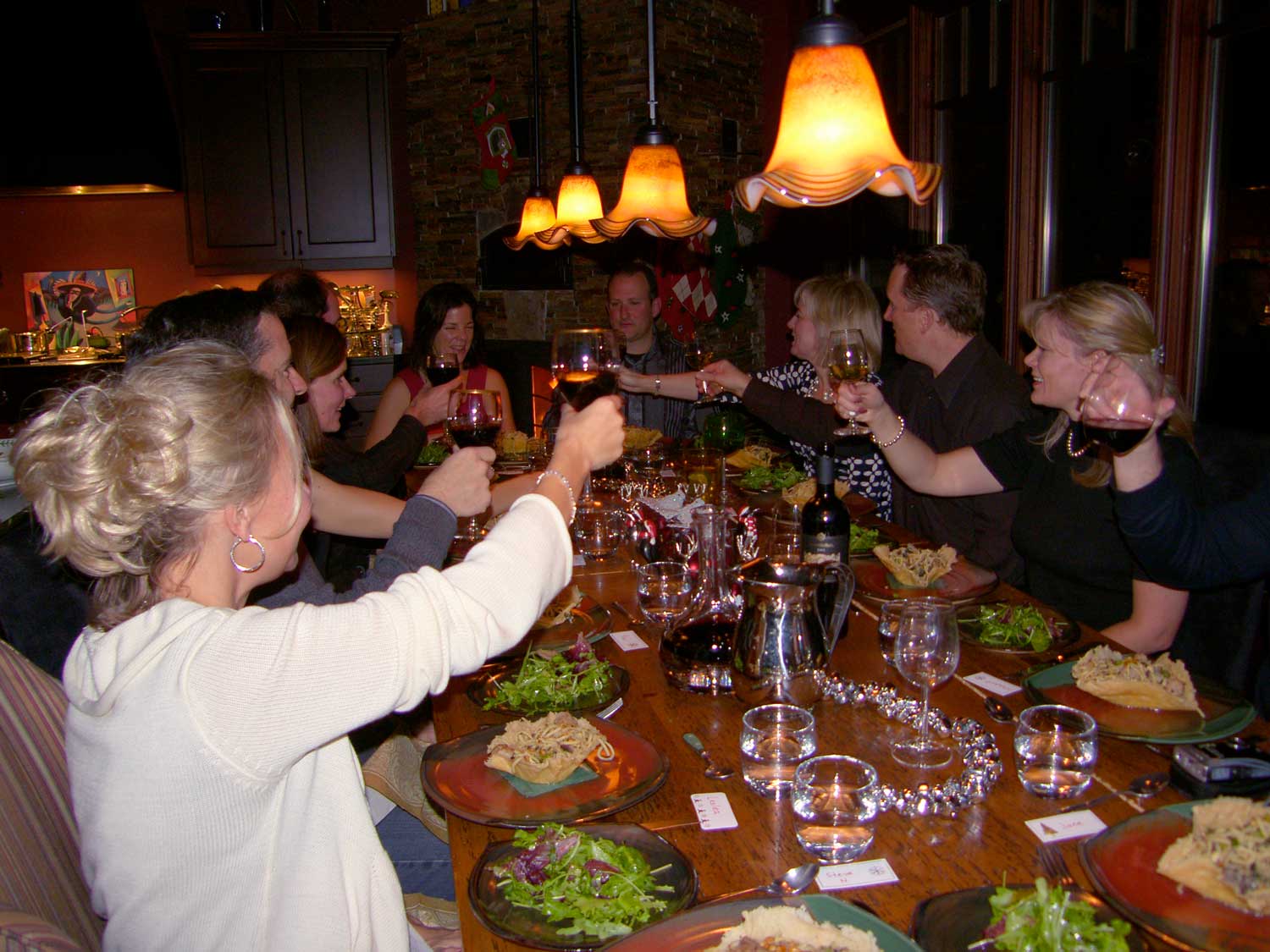
5. Enjoy!
Good relationships are good for your health. Enjoy the buzz of the conversation you’ve helped create. Pat yourself on the back. Soak up the fine details and the happy moments while you connect with companions breaking bread under your roof.
Special occasion entertaining doesn’t need to be stressful when you follow these tips:
Bonus tip: Source the best-quality food ingredients within your budget. Careful sourcing is a large part of your WOW factor as a host, and when your ingredients are THAT good and fresh, you can often use simpler cooking methods.
Download this printable cheatsheet here!
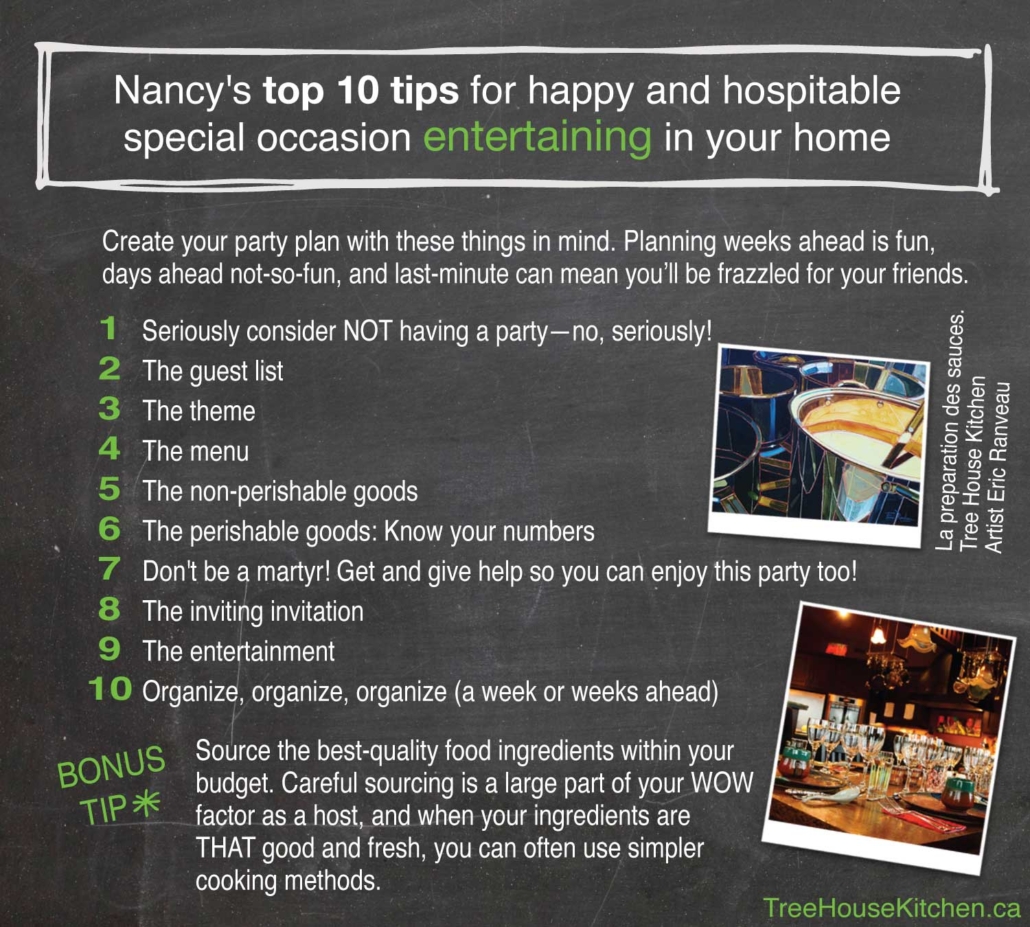



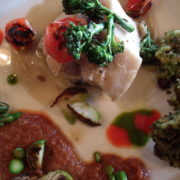
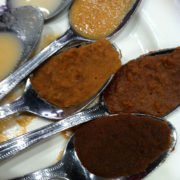


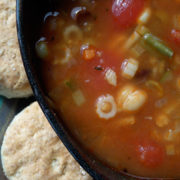


Leave a Reply
Want to join the discussion?Feel free to contribute!